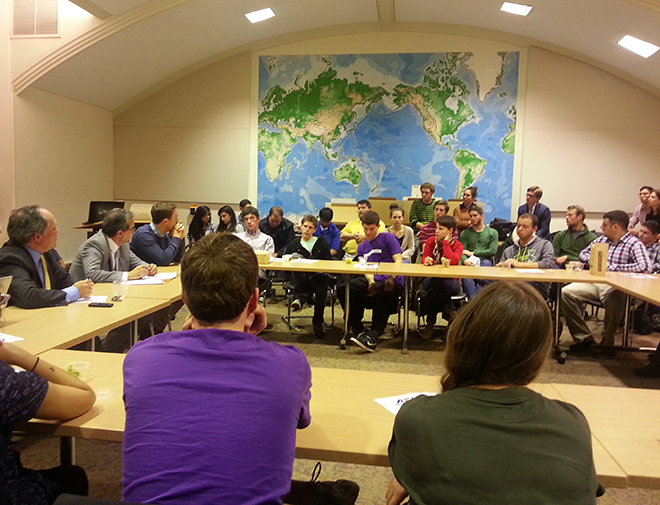
On Monday evening, Dr. Nabeel Khoury, a visiting scholar in Northwestern’s Middle East and North African studies department, and Dr. Michael Rubin, a former Pentagon official, discussed in events in the Middle East and the United States’ policies and practices in the region in a speech called the “New Map of the Middle East.”
80 students attended the speech in Scott Hall, which was hosted by The Alexander Hamilton Society and American Enterprise Institute, an organization that sponsors foreign policy discussions on campus.
The speech centered on the experiences that Khoury and Rubin gained while working in the Middle East and within the US government. They presented their respective viewpoints on topics ranging from the Iraq War of 2003 to the current entanglement with ISIS.
“Hearing from Dr. Khoury and Dr. Rubin, you get two viewpoints contrasted on issues that you don’t always get in classrooms, necessarily,” Weinberg senior Wilson Shirley said.
Both men were, to some degree, critical of the current administration’s handling of foreign policy in the Middle East.
Khoury opened the panel discussion by saying that the Obama administration “has a very good understanding of what’s happening in the Middle East, and in general has the right values in terms of what it would like to see happen,” but lacks the means of developing a strategy of implementation.
“There is no Kissinger,” Khoury said. “There is no one who listens to the President and says, ‘I get you, I understand what you want to do, here’s the plan. This leads to inconsistent behavior and inconsistent policy and it leads to confusing a lot of people in the region.”
In response to Khoury’s statements, Rubin said “It’s been more than a quarter century since the United States has had a coherent strategy in the Middle East and the will to implement that strategy.”
Khoury and Rubin also discussed the role of the various ideologies, religions and cultures found in the Middle East and how they should shape the United States’ response to crises in the region.
Rubin pointed out that in 1946, the intelligence division of the Department of War predicted that the “rise of political Islamism” would become a security threat, even before the partition of Palestine.
“We do need to recognize that what you have going on in the Middle East is not a problem of religion, but a problem of religious interpretation,” Rubin said.
Khoury countered that lumping extremists’ attitudes towards the US with other, moderate and mainstream groups when talking about policy doesn’t allow for comprehensive or smart action. He said it would even be a mistake to think that Middle Eastern attitudes towards US foreign policy are indicative of attitudes towards Western culture.
“We spend a lot of money in the wrong way in public diplomacy, trying to talk about how democratic the US is and how Islam in America thrives – they all know that,” he said, pointing to the long visa lines he had seen while working for the government. “We have to be careful and not paint everyone with the same brush.”
Students and audience members were given the chance to ask questions after the panel discussion concluded.
“I was impressed with what Dr. Khoury and Dr. Rubin had to say,” said Weinberg junior Jeff Marshall. “They proposed new ways of thinking about and framing what’s going on over in the Middle East.”
Marshall said that the panel was meant to be more collaborative than debate-oriented.
“Both sides got their points out without attacking each other and getting lost in the argument,” he said. “The more information that is out there, the more that helps us work towards solutions as a society. It inches us closer to resolving conflicts.”